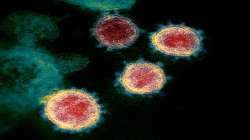New nanobody-based treatments may help fight Covid
The nanobody also recognised the original SARS-CoV virus (which causes SARS), indicating it may provide cross-protection against these two human coronaviruses, the researchers said.

Australian researchers have identified neutralising nanobodies that block the SARS-CoV-2 virus from entering cells in preclinical models, an advance that paves the way for investigations into nanobody-based treatments for Covid-19.
Nanobodies --A tiny immune proteins -- can provide an alternative to conventional antibody treatments for Covid-19.
By mapping nanobodies, the research team led by Wai-Hong Tham, Associate Professor at WEHI in Victoria, Australia, was able to identify a nanobody that recognised the SARS-CoV-2 virus, including emerging global variants of concern.
The nanobody also recognised the original SARS-CoV virus (which causes SARS), indicating it may provide cross-protection against these two human coronaviruses, the researchers said.
ALSO READ | This human molecule is helping Covid virus escape antibodies
"In the wake of Covid-19, there is a lot of discussion about pandemic preparedness. Nanobodies that are able to bind to other human beta-coronaviruses -- including SARS-CoV-2, SARS-CoV and MERS -- could prove effective against future coronaviruses as well," Tham said.
For the study, published in the journal PNAS, the team examined a group of alpacas -- a species of South American camelid mammal -- in regional Victoria The species are known to produce nanobodies naturallyA in response to infection.
The alpacas were immunised with a synthetic, non-infectious part of the SARS-CoV-2 'spike' protein to enable them to generate nanobodies against the SARS-CoV-2 virus.
"The synthetic spike protein is not infectious and does not cause the alpacas to develop disease -- but it allows the alpacas to develop nanobodies," Tham said.
"We can then extract the gene sequences encoding the nanobodies and use this to produce millions of types of nanobodies in the laboratory, and then select the ones that best bind to the spike protein," she added.
The leading nanobodies that block virus entry were then combined into a 'nanobody cocktail'. As a result, the researchers were able to test its effectiveness at blocking SARS-CoV-2 from entering cells and reducing viral loads in preclinical models.
ALSO READ | Multivitamins, omega-3, probiotics may cut risk of COVID-19: Study